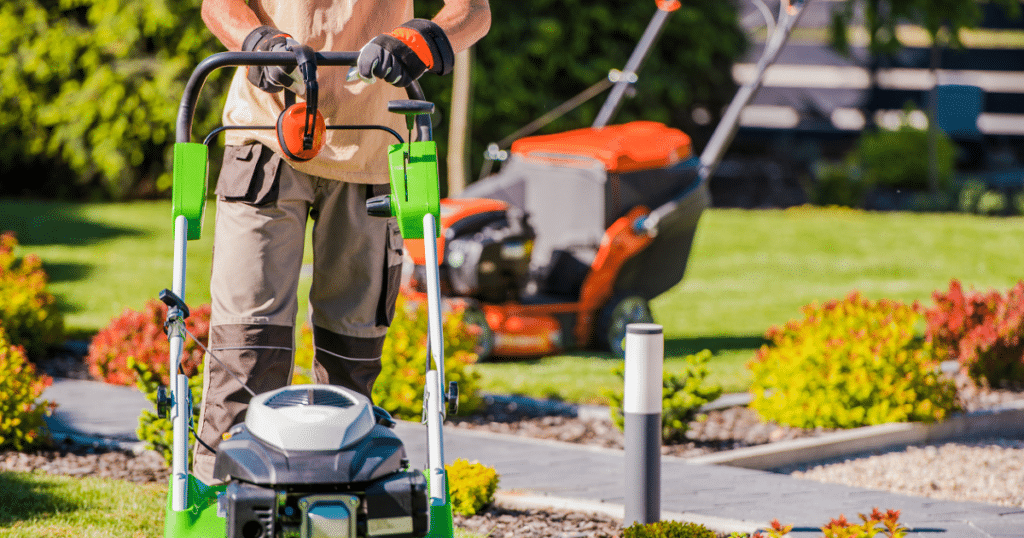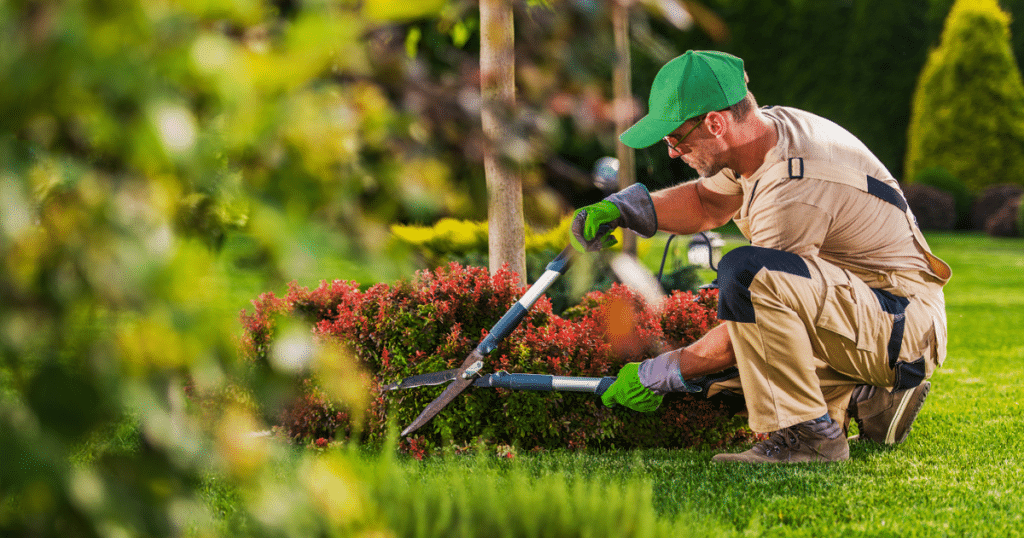
Are you tired of staring at your lackluster lawn, dreaming of a lush oasis right outside your window? Well, my friend, it’s time to unleash your inner green thumb and dive into the exciting world of landscaping! But hold on tight because, in this article, we’ve got all the dirt (pun intended) on what it takes to be a top-notch landscaper. From artistic vision to practical know-how, we’re about to sprinkle some serious wisdom that will leave you itching to grab a shovel and get your hands dirty!
To be a landscaper, you’ll need a combination of creativity, knowledge, and physical stamina. A keen eye for design, an understanding of plants and their care, and the ability to handle the demands of outdoor work are essential. So, grab your imagination, a green thumb, and a sturdy pair of gloves because the world of landscaping awaits!
The Definition of Landscaping
Landscaping is the art and science of designing, planning, and modifying outdoor spaces to create visually appealing and functional environments. The practice involves selecting appropriate plants, trees, shrubs, and other natural elements to create a cohesive aesthetic that enhances the property’s existing features. In addition to plant selection, landscapers also work with hardscape materials like rocks, stones, and pavers to create walkways, patios, retaining walls, or other structures that complement the surroundings.
The Importance of Landscaping
Landscaping is essential in improving the overall look of any outdoor space. A well-designed landscape can enhance a property’s beauty while also increasing its value.
A properly maintained landscape can also provide many environmental benefits, such as reducing noise pollution from traffic or creating habitats for wildlife. Moreover, studies have shown that people who live or work in places surrounded by greenery are less stressed and more productive.
Overview of Becoming a Landscaper
Embarking on a fulfilling journey as a landscaper necessitates a deep-seated passion for nature and a knack for artistic expression. To excel in this field, one must possess an innate love for the outdoors, coupled with a creative mindset, enabling the design of captivating landscapes that harmoniously blend functionality and aesthetic appeal. If you’re wondering what do you need to be a landscaper, these qualities, coupled with dedication and hard work, form the foundation for success in this captivating profession.
Additionally, being physically fit is crucial since landscaping often involves working outdoors in varying weather conditions. In terms of formal education requirements for becoming a landscaper, there are some options available, including high school diplomas or equivalent GEDs, associate degrees in horticulture or landscape design, bachelor’s degrees in fields such as environmental science or architecture, as well as on-the-job training.
Apprenticeships are another way one can gain experience in landscaping while also earning certification through organizations like the National Association of Landscape Professionals (NALP). Apprenticeships typically last anywhere from one to three years and allow individuals to learn the ropes from experienced professionals in the field.
For anyone with a passion for the outdoors, creativity, and an eye for design, a career in landscaping can prove to be rewarding both personally and professionally. It is important to remember that becoming a successful landscaper requires hard work, dedication, and a desire to learn and grow as an artist.
Education and Training
Landscaping is a highly skilled profession that involves both creativity and technical knowledge. If you are interested in pursuing a career in landscaping, the first step is to obtain the necessary education and training. There are several paths you can take to become a landscaper, including obtaining a high school diploma or equivalent, pursuing a college degree in landscape architecture or horticulture, or completing an apprenticeship or on-the-job training.
High school diploma or equivalent
A high school diploma or equivalent is usually the minimum requirement for most entry-level positions in landscaping. This level of education will provide you with basic skills such as reading, writing, and math that are essential for understanding blueprints and calculating measurements. Additionally, it will help you develop communication skills that are important for working with clients.
College degree in landscape architecture, horticulture, or related field
For those who aspire to become professional landscapers, obtaining a four-year college degree in landscape architecture, horticulture, or a related field can be highly beneficial. These programs provide students with the knowledge and skills needed to design outdoor spaces that are both functional and aesthetically pleasing. Students learn about various aspects of landscaping, such as plant identification and care; soil types; irrigation systems; drainage systems; grading techniques; lighting design; and sustainable practices.
Landscape Architecture Degree:
A degree program in landscape architecture prepares students for careers as designers who create outdoor spaces such as parks, recreational areas, residential communities, etc. The curriculum includes courses such as site planning & analysis, landscape design history, plant materials & identification, construction materials & techniques, etc.
Horticulture Degree:
Horticultural degrees focus on plants’ growth & production, which includes plant identification, propagation that helps professionals produce plants indoors under controlled conditions, growing plants in greenhouses, nursery management, etc.
Apprenticeship or on-the-job training
Another way to become a landscaper is through an apprenticeship or on-the-job training. This type of education is hands-on and provides practical experience working in a landscaping business.
Apprenticeships typically last several years and involve working under the guidance of an experienced landscaper who can provide valuable mentoring and networking opportunities. With on-the-job training, you will learn the basics of landscaping by assisting landscapers with tasks such as mowing lawns, pruning shrubs, etc.
Education and training are essential for becoming a successful landscaper. Whether you choose to obtain a high school diploma or pursue a college degree or take up an apprenticeship/on-the-job training program, having the right skills and knowledge will help you succeed in this highly skilled profession.
Skills and Abilities
Being a landscaper requires a diverse set of skills and abilities, ranging from knowledge of plants and irrigation systems to physical stamina for outdoor work. Here are some of the key skills and abilities that are essential for a successful career in landscaping.
Knowledge of Plants, Trees, and Shrubs
A landscaper must have an in-depth understanding of various species of plants, trees, shrubs as well as their growth patterns and requirements. They need to know which plants thrive in different environmental conditions such as moisture levels, light exposure, temperature zone, and pH levels, among other factors.
A landscaper must also be knowledgeable about each plant’s maintenance requirements, such as pruning or trimming, to ensure they grow healthily. This expertise is critical when selecting the right plant species for specific landscape designs.
Understanding of Soil Types and Irrigation Systems
A good understanding of soil types is crucial when designing landscapes since it plays a significant role in determining what type of plants can grow successfully. Landscapers must be familiar with different soil types, such as clay soils or sandy soils, and understand how they affect vegetation growth patterns.
Having knowledge about irrigation systems helps designers know how much water is required by the various plant species based on factors such as location or time seasonality. A profound understanding would help prevent over-irrigation or under-irrigation.
Ability to Read Blueprints and Design Plans
A great landscaping design starts with proper planning, which includes drawing up blueprints for the outdoor space before any installation work commences. Landscapers should have excellent technical drawing abilities to communicate their ideas effectively through blueprints that other professionals can understand quickly. Besides creating accurate sketches on paper, landscapers require digital tools to create 2D drawings using CAD software or even 3D models to provide clients with a visual representation of what their outdoor space would look like.
Creativity in Designing Outdoor Spaces
Landscaping is an artistic expression of combining the various elements of nature to create beautiful outdoor spaces. Landscapers must be creative, imaginative, and innovative when designing spaces that will evoke certain moods or feelings as well as complement the architecture or space function. They should have a vast knowledge of design elements such as texture, color, balance, and harmony to create impressive designs that are aesthetically pleasing and practical.
Physical Stamina for Outdoor Work
Being a landscaper requires working outdoors in all types of weather conditions and physically demanding work like digging holes, lifting heavy objects, pruning trees, or carrying equipment. Landscapers need to maintain good physical health because landscaping jobs require stamina and endurance. The ability to work long hours in high heat or cold temperatures is part of the job description.
Being an excellent landscaper requires one to be knowledgeable about plants and irrigation systems. Also, they need to have technical abilities like reading blueprints and designing plans creatively while at the same time having the physical stamina needed for outdoor work.
Tools and Equipment

Basic Hand Tools
A landscaper’s toolkit should always begin with the most basic of tools, the hand tools. These include shovels, rakes, hoes, pruners, and shears. They are essential for planting flowers, shrubs, or trees as well as maintaining lawns and gardens.
Shovels are used to dig holes for planting, while rakes are great for removing debris from the lawn or garden bed. Hoes help break up soil and move it around, while pruners and shears are used to cut and shape plants.
Power Tools
Power tools make gardening tasks a lot easier and faster to complete. Lawnmowers come in various types, including push mowers, riding mowers, zero-turn mowers, and robotic lawnmowers.
Edgers provide clean edges between lawns and gardens, while trimmers can be used for shaping bushes or cutting grass along hard-to-reach spots. Leaf blowers can also be useful when cleaning up fallen leaves in autumn.
Heavy Equipment
Heavy equipment is usually reserved for larger landscaping projects, such as regarding a whole property or removing large trees. Bulldozers are commonly used to move large amounts of soil around a property – they’re great at leveling out large areas quickly but require skillful operation! Excavators are also ideal for digging holes, especially when dealing with rocky soils that hand shoveling cannot handle on its own.
The Benefits of Using Professional Tools
While owning these professional-grade tools may seem like an expensive investment at first glance, they ultimately pay off by saving time on landscaping jobs which translates to more profit overall. Additionally, using high-quality gear not only makes work easier but also results in higher-quality final outcomes that clients will appreciate.
Caring For Your Tools
It’s important to take care of your landscaping equipment, regardless of whether it costs $10 or $10,000. Basic hand tools should be cleaned and oiled after each use. Power tools should be kept clean and sharp, with spark plugs changed out regularly, and others maintained as needed.
Heavy equipment requires more maintenance, such as regular oil changes, lubrication of gears and chains, and proper storage when not in use. By taking care of your tools, you’ll ensure they last longer while also making sure they work the way they’re intended to when you need them most!
Business Skills
Landscaping is not just about designing outdoor spaces and planting flowers. It is also about running a business.
As a landscaper, you need to have a strong understanding of business management principles. This includes knowledge of accounting, human resources, and operations management.
In addition, it is important to have an understanding of legal issues related to running a landscaping business. A successful landscaping business requires more than just good design skills.
It requires the ability to manage employees, control expenses, and handle cash flow. Therefore, it’s important that a landscaper has adequate knowledge of these principles before starting or managing their own business.
Marketing Skills for Attracting Clients
To succeed as a landscaper today requires excellent marketing skills. You need to be able to target potential clients with advertising campaigns that speak directly to their interests and needs.
A good marketing campaign can help you stand out from the competition and attract more clients. One effective way to market your services as a landscaper is by building relationships in your local community.
Join local groups such as community gardens or homeowner associations where you can build relationships while showcasing your work. Another way to market yourself effectively is through social media platforms like Facebook, Instagram, or Twitter, where you can post pictures of your work or share informative content that educates others on how they, too, can maintain their outdoor spaces.
Financial Management Skills for Budgeting Expenses
One aspect that shouldn’t be overlooked when running your own landscaping business is financial management skills, which include budgeting expenses wisely so that profits are maximized throughout the year. To ensure that you stay profitable during slow periods like winter months when jobs are few and far between- proper financial planning should be done ahead of time so that income flows consistently year-round, avoiding seasonal peaks and valleys.
It’s also important for landscapers who run their own businesses to keep detailed financial records, including receipts and invoices for all expenses and income generated from each job so that they can track their business performance over time. While creativity and design are essential skills for a successful landscaper, having good business skills is equally important.
That means having a solid understanding of financial management principles, marketing strategies, and legal issues related to running a business. By focusing on these skills along with your landscaping abilities, you can run your own landscaping business profitably and efficiently.
Legal Requirements
Landscaping is a profession that involves working on someone’s property and, as such, involves certain legal requirements. You may be required to have a license and insurance coverage before you can start your business. The specific requirements vary depending on the location of your business.
Licensing requirements in your state
Each state has its own licensing laws for landscapers. Some states require that anyone working on a landscape project must be licensed, while others only require licensing for high-value projects. To obtain a license, you will need to meet certain criteria, such as having the required education and experience.
In some states, there may also be an exam or a practical test that requires applicants to demonstrate their knowledge and skills in the field of landscaping. Once you have obtained your license, you will be able to work legally in your state and potentially qualify for more jobs than if you did not hold this credential.
It is important to research the specific licensing requirements in your state before starting any landscaping work. Failure to comply with these rules could result in hefty fines or even legal action against you.

Insurance coverage needed
As with any business, it is important to protect yourself from liability by obtaining appropriate insurance coverage. Landscaping work can involve some level of risk due to factors such as working with heavy equipment or handling chemicals.
One type of insurance that landscapers should consider is general liability insurance which covers damage caused to someone else’s property during the course of work being done by the landscaper or their employees. Workers’ compensation insurance is also important since it covers medical expenses and lost wages for employees who are injured while on the job.
It’s worth noting that many clients may require proof of both general liability and workers’ compensation insurance before hiring a landscaper for their project. This means that having adequate insurance coverage could open up more job opportunities for you.
Obtaining a license and insurance coverage are necessary legal requirements for anyone looking to start their own landscaping business. Licensing requirements vary by state and may include education, experience, and testing.
Insurance coverage should include general liability and workers’ compensation to protect both the landscaper and their clients from potential risks. By complying with these legal requirements, landscapers can establish themselves as reputable professionals in the industry.
Career Opportunities
Working for a landscaping company
One of the most common career paths for landscapers is to work for a landscaping company. These companies are typically small to medium-sized businesses that provide landscape design, installation, and maintenance services to residential and commercial customers.
Working for a landscaping company can be a great way to gain experience in the field, learn about different types of plants and design styles, and build relationships with clients. The duties of a landscaper working for a company can vary widely depending on the size of the company and its specific focus.
Entry-level positions may involve mostly manual labor, such as digging holes, planting trees or shrubs, or laying sod. As you gain experience, you may take on more responsibility, such as designing outdoor spaces or managing projects from start to finish.
Some benefits of working for a landscaping company include steady work hours, access to equipment and supplies provided by the company, and opportunities for career advancement. Many companies offer training programs or apprenticeships that allow you to learn new skills while on the job.
Starting your own landscaping business
For those who want more control over their schedule and earnings potential, starting your own landscaping business can be an excellent option. Starting your business requires more than just knowing how to mow lawns; it involves developing an extensive knowledge of plant care principles as well as marketing strategies for attracting clients.
To start your own business, you will need to develop a clear business plan that outlines your goals and objectives. This will include determining what types of services you want to offer (e.g., lawn maintenance vs.
landscape design), identifying target markets (e.g., residential vs. commercial), and setting competitive pricing rates based on market research in your area. Marketing is key when starting any new business venture.
You will need an effective promotional strategy that reaches out locally through social media channels like Instagram, Facebook, and Google My Business. You can also advertise your services in local publications or with flyers distributed in targeted neighborhoods.
As a small business owner, you’ll be responsible for managing everything from bookkeeping and taxes to hiring employees. You may want to consider taking business management classes or working with a mentor who has experience in the industry.
RELATED: When Is The Best Time To Hire A Landscaper: Maximize the Beauty of Your Outdoor Space
Frequently Asked Questions
What skills do you need to be a landscape?
To be a landscaper, you need skills such as design aesthetics, plant knowledge, horticultural expertise, and proficiency in various landscaping techniques and equipment operations.
What degree is best for a landscaper?
While a specific degree is not always required, degrees in landscape architecture, horticulture, or related fields can provide valuable knowledge and enhance career prospects for a landscaper.
What are landscape characteristics?
Landscape characteristics refer to the distinguishing features and elements present in a particular landscape, including terrain, vegetation, water features, climate, and overall visual composition.
What does a landscape designer need?
A landscape designer needs a combination of artistic creativity, design skills, plant knowledge, the ability to understand clients’ needs, and proficiency in using design software and tools to conceptualize and create visually appealing outdoor spaces.
Which career is related to landscaping?
Careers related to landscaping include landscape architects, horticulturists, garden designers, groundskeepers, landscape contractors, and nursery managers, among others.
Why choose a professional landscaper?
Choosing a professional landscaper ensures access to their expertise, experience, and specialized knowledge, resulting in well-designed and maintained outdoor spaces, efficient use of resources, and the ability to transform landscapes into beautiful and functional environments.
Conclusion
Becoming a landscaper requires a combination of education, skills, and business acumen. It starts with obtaining a high school diploma or its equivalent and pursuing further education in landscape architecture, horticulture, or related fields.
Aspiring landscapers can also gain practical experience through apprenticeships or on-the-job training. To succeed in the industry, landscapers must have an understanding of plants and soil types, irrigation systems, and landscaping tools such as power tools and heavy equipment.
They must also possess the creativity to create beautiful outdoor spaces for clients. Aside from technical expertise, business management principles are crucial to running a successful landscaping business.
Marketing skills to attract clients and financial management skills for budgeting expenses are necessary as well. Legal requirements vary by state; therefore, acquiring the necessary licensing requirements in your state is vital.
Insurance coverage is also needed. There are several career opportunities in the industry, including working for an established landscaping company or even starting your own landscaping business with enough dedication and hard work.
The landscaping industry offers diverse opportunities for those who love nature and have an eye for beauty. You’ll get the chance to work outdoors while creating beautiful landscapes that enhance people’s lives. It’s satisfying to turn someone’s backyard into an oasis they can enjoy with their family and friends.
It is also a fulfilling career because designing outdoor spaces allows you to contribute positively towards environmental sustainability by creating green spaces that help purify air quality and provide habitats for wildlife species while improving aesthetics. If you’re looking for a career that allows you the freedom of self-employment coupled with job satisfaction working outside year-round with flexible hours based on seasonal demand, then consider becoming a landscaper!






